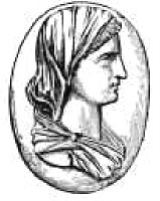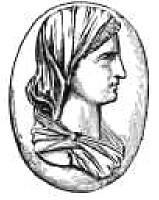
God as the Devil
Encyclopedia
The teaching of God as the Devil has been an accusation leveled at various Christian heretics from the 2nd century to the medieval period. In the modern period authors, such as Thomas Paine, have made the case that the Biblical
god
is a divine force that wreaks suffering, death, and destruction and that tempts or commands humanity into committing mayhem and genocide.
God is depicted as the source of both light and darkness, as in Isaiah 45:6-7. However this concept of "darkness" and "evil" is not equivalent to "the devil
," a later development in Jewish thought.
 Tertullian
Tertullian
accuses Marcion of Sinope
, the first major heretic of Christianity in the 1st century AD, that he "[held that] the Old Testament was a scandal to the faithful … and … accounted for it by postulating [that Jehovah was] a secondary deity, a demiurgus
, who was god, in a sense, but not the supreme God; he was just, rigidly just, he had his good qualities, but he was not the good god, who was Father of Our Lord Jesus Christ." The Church condemned his writings as heretical.
John Arendzen
(1909) in the Catholic Encyclopedia
(1913) mentions that Eusebius accused Apelles
, the 2nd century AD Gnostic, of considering the Inspirer of Old-Testament prophecies to be not a god, but an evil angel.
Hegemonius
(4th C.) accuses the Persian prophet Mani
, founder of the Manichaean sect in the 3rd century AD, identified Jehovah as "the devil god which created the world" and said that "he who spoke with Moses, the Jews, and the priests … is the [Prince] of Darkness, … not the god of truth."
According to their critics, these heretics referred to the Abrahamic God variously as
"a demiurgus
",
"an evil angel",
"the devil god",
"the Prince of Darkness",
"the source of all evil",
"the Devil",
"a demon",
"a cruel, wrathful, warlike tyrant", "Satan"
and "the first beast of the book of Revelation".
Nicholas Weber in the Catholic Encyclopedia article Albigenses (1907) notes that the enemies of the Albigenses, a Christian sect in 12th- and 13th-century France, a branch of the Cathari, accused them that their doctrine held that "the creator … of the material world … is the source of all evil … He created the human body and is the author of sin … The Old Testament must be either partly or entirely ascribed to him; whereas the New Testament is the revelation of the beneficent God." They ultimately came into conflict with both the civil order and the Church which lead to the Albigensian Crusade
.
wrote in The Age of Reason that "Whenever we read the obscene stories, the voluptuous debaucheries, the cruel and torturous executions, the unrelenting vindictiveness, with which more than half the Bible is filled, it would be more consistent that we called it the word of a demon, than the Word of God."
Bible
The Bible refers to any one of the collections of the primary religious texts of Judaism and Christianity. There is no common version of the Bible, as the individual books , their contents and their order vary among denominations...
god
God
God is the English name given to a singular being in theistic and deistic religions who is either the sole deity in monotheism, or a single deity in polytheism....
is a divine force that wreaks suffering, death, and destruction and that tempts or commands humanity into committing mayhem and genocide.
Judaism
In the Hebrew BibleHebrew Bible
The Hebrew Bible is a term used by biblical scholars outside of Judaism to refer to the Tanakh , a canonical collection of Jewish texts, and the common textual antecedent of the several canonical editions of the Christian Old Testament...
God is depicted as the source of both light and darkness, as in Isaiah 45:6-7. However this concept of "darkness" and "evil" is not equivalent to "the devil
Devil
The Devil is believed in many religions and cultures to be a powerful, supernatural entity that is the personification of evil and the enemy of God and humankind. The nature of the role varies greatly...
," a later development in Jewish thought.
David's Satan
Many authors have questioned the apparent contradiction correspondence in two Biblical passages. Their significance has been debated by Biblical scholars through the ages, where an action attributed to God in 2 Samuel 24:1 is apparently attributed to Satan in 1 Chronicles 21:1.Heretics in The Early Church
There is no firsthand evidence that any heretic of the early church ever described the God of the Bible as the devil.
Tertullian
Quintus Septimius Florens Tertullianus, anglicised as Tertullian , was a prolific early Christian author from Carthage in the Roman province of Africa. He is the first Christian author to produce an extensive corpus of Latin Christian literature. He also was a notable early Christian apologist and...
accuses Marcion of Sinope
Marcion of Sinope
Marcion of Sinope was a bishop in early Christianity. His theology, which rejected the deity described in the Jewish Scriptures as inferior or subjugated to the God proclaimed in the Christian gospel, was denounced by the Church Fathers and he was excommunicated...
, the first major heretic of Christianity in the 1st century AD, that he "[held that] the Old Testament was a scandal to the faithful … and … accounted for it by postulating [that Jehovah was] a secondary deity, a demiurgus
Demiurge
The demiurge is a concept from the Platonic, Neopythagorean, Middle Platonic, and Neoplatonic schools of philosophy for an artisan-like figure responsible for the fashioning and maintenance of the physical universe. The term was subsequently adopted by the Gnostics...
, who was god, in a sense, but not the supreme God; he was just, rigidly just, he had his good qualities, but he was not the good god, who was Father of Our Lord Jesus Christ." The Church condemned his writings as heretical.
John Arendzen
John Arendzen
John Peter Arendzen , was a Catholic priest who spread the Catholic faith in England. He was once named by the Daily Mail "one of the preachers of the century"...
(1909) in the Catholic Encyclopedia
Catholic Encyclopedia
The Catholic Encyclopedia, also referred to as the Old Catholic Encyclopedia and the Original Catholic Encyclopedia, is an English-language encyclopedia published in the United States. The first volume appeared in March 1907 and the last three volumes appeared in 1912, followed by a master index...
(1913) mentions that Eusebius accused Apelles
Apelles (gnostic)
Little is known about Apelles . He was a disciple of Marcion, probably at Rome, but left the Marcionite society...
, the 2nd century AD Gnostic, of considering the Inspirer of Old-Testament prophecies to be not a god, but an evil angel.
Hegemonius
Hegemonius
Hegemonius or Pseudo Hegemonius was a 4th Century Christian who is known only from his presumed authorship of the Acta Archelai, a work on Manichaeism preserved only in Latin....
(4th C.) accuses the Persian prophet Mani
Mani (prophet)
Mani , of Iranian origin was the prophet and the founder of Manichaeism, a gnostic religion of Late Antiquity which was once widespread but is now extinct...
, founder of the Manichaean sect in the 3rd century AD, identified Jehovah as "the devil god which created the world" and said that "he who spoke with Moses, the Jews, and the priests … is the [Prince] of Darkness, … not the god of truth."
According to their critics, these heretics referred to the Abrahamic God variously as
"a demiurgus
Demiurge
The demiurge is a concept from the Platonic, Neopythagorean, Middle Platonic, and Neoplatonic schools of philosophy for an artisan-like figure responsible for the fashioning and maintenance of the physical universe. The term was subsequently adopted by the Gnostics...
",
"an evil angel",
"the devil god",
"the Prince of Darkness",
"the source of all evil",
"the Devil",
"a demon",
"a cruel, wrathful, warlike tyrant", "Satan"
and "the first beast of the book of Revelation".
Heretics in the Middle Ages
Likewise there is no first-hand evidence that any medieval heretic ever called the God of the Bible the devil.Nicholas Weber in the Catholic Encyclopedia article Albigenses (1907) notes that the enemies of the Albigenses, a Christian sect in 12th- and 13th-century France, a branch of the Cathari, accused them that their doctrine held that "the creator … of the material world … is the source of all evil … He created the human body and is the author of sin … The Old Testament must be either partly or entirely ascribed to him; whereas the New Testament is the revelation of the beneficent God." They ultimately came into conflict with both the civil order and the Church which lead to the Albigensian Crusade
Albigensian Crusade
The Albigensian Crusade or Cathar Crusade was a 20-year military campaign initiated by the Catholic Church to eliminate Catharism in Languedoc...
.
Thomas Paine
The 18th-century Anglo-American philosopher Thomas PaineThomas Paine
Thomas "Tom" Paine was an English author, pamphleteer, radical, inventor, intellectual, revolutionary, and one of the Founding Fathers of the United States...
wrote in The Age of Reason that "Whenever we read the obscene stories, the voluptuous debaucheries, the cruel and torturous executions, the unrelenting vindictiveness, with which more than half the Bible is filled, it would be more consistent that we called it the word of a demon, than the Word of God."

